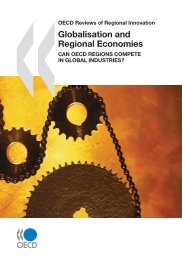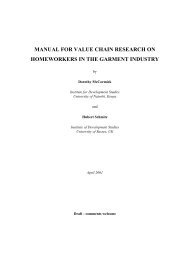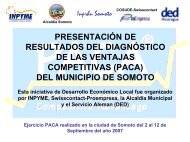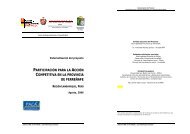OECD Culture and Local Development.pdf - PACA
OECD Culture and Local Development.pdf - PACA
OECD Culture and Local Development.pdf - PACA
You also want an ePaper? Increase the reach of your titles
YUMPU automatically turns print PDFs into web optimized ePapers that Google loves.
NOTES<br />
16. V. Ponthieux S. (2003), p. 37<br />
17. www.worldvaluesurvey.org<br />
18. Attempts to measure social capital, moreover, make more use of indicators of networks or institutions<br />
than those of culture, hence the stress on the relationship between capitalism <strong>and</strong> democracy.<br />
19. Democracy <strong>and</strong> economic development are linked by a system of time-lags that covers all possible<br />
interpretations, <strong>and</strong> the results show a doubly positive linkage, from democracy to development, <strong>and</strong><br />
from development to democracy (Barro attaches a number of reservations to these outcomes however).<br />
20. By giving priority to games <strong>and</strong> institutions over values, social capital may be likened to a resource<br />
that is as favourable as it is significant. A more controversial viewpoint sees social capital as a matter<br />
of conflicts that are costly to society <strong>and</strong> a source of social differentiation that can work against<br />
development (Bourdieu).<br />
21. L<strong>and</strong>ry C. (2003), p.21<br />
22. idem, pp.52-53<br />
23. This ability to think in terms of plans <strong>and</strong> projects does not automatically imply an ability to manage<br />
complex <strong>and</strong> r<strong>and</strong>om relationships, to recognise <strong>and</strong> appreciate individual initiatives, <strong>and</strong> to work<br />
with market mechanisms<br />
24. The social attitude that fosters, prolongs or stifles individual initiatives is specific to each territory.<br />
Drawing upon values <strong>and</strong> the institutions that have shaped them, the entrepreneurial culture is a result<br />
of their history, an element of their heritage.<br />
25. The survey was conducted in 1995-96 for DG V as part of a programme to analyse local development.<br />
It covered zones in Germany: Oberhausen (Westphalia), in Austria: Graz, in Belgium: Genk, Liège, in<br />
Denmark : Loll<strong>and</strong>, in France : Roubaix-Tourcoing, Saint Etienne, Saint Nazaire, in Greece : Tripolis<br />
(Arcadia), in Irel<strong>and</strong> : Cork, Shannon; in Italia: Ravenna, Turin; in Portugal : Covilha; <strong>and</strong> in the United<br />
Kingdom: Nottingham, Armanagh (Northern Irel<strong>and</strong>).<br />
26. Having capital is an important factor, as three results testify: having received capital or money early<br />
in life is an important factor for independent employment, as was demonstrated in a longitudinal study<br />
by the National Child <strong>Development</strong> Survey; those whose projects failed always cite the difficulty of<br />
getting start-up capital; owning a house can produce capital gains that one can reinvest, or it can be<br />
used as collateral for a bank loan.<br />
27. An example is the Futuroscope programme of “innovative pilot high schools” that provide training for<br />
young people <strong>and</strong> adults in France. They seek to develop a project <strong>and</strong> enterprise culture in various<br />
ways, through teaching, apprenticeship <strong>and</strong> the demonstration of new technologies. This culture<br />
becomes the driving force of the training institute <strong>and</strong> allows it to appropriate the values of creativity,<br />
communication, association, adaptation, etc. In the teaching of the enterprise culture, students learn<br />
about economic issues, project management, <strong>and</strong> running a business. Useful as they are, these studies<br />
are limited by their abstract nature. Learning the project culture therefore also includes a period of<br />
apprenticeship in industry for all trainees. The enterprise culture is also appropriated through the<br />
practical use of new technologies, stressing some of the values of that culture: creativity, with the help<br />
of design software, word processing, CAD etc.; mobility <strong>and</strong> flexibility, with IT tools now used on a<br />
time-sharing <strong>and</strong> networking basis; information processing; managing complexity.<br />
190 CULTURE AND LOCAL DEVELOPMENT - ISBN 92-64-00990-6 - © <strong>OECD</strong> 2005














